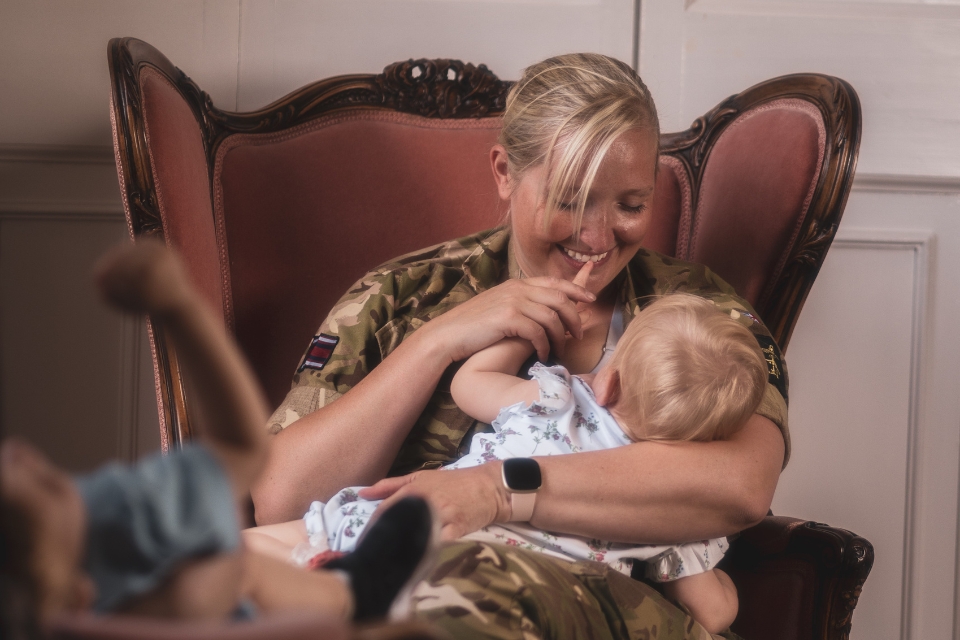Being pregnant and infant feeding within the UK Armed forces is a challenge for many servicewomen and their families. To assist support the Defence Breastfeeding Network (DBN) was established to provide peer support and guidance for Armed Forces families during pregnancy, maternity leave and beyond when it came to breastfeeding. Natasha Day MBE, Defence Breastfeeding Network Chair, shares how this works practically and encourages other employers to match the support, enabling women to return to the workplace.
______________________________________________________________________
The amount of breastfeeding support received can make or break a breastfeeding journey for many parents, and literature has highlighted over and over again that there needs to be more done to facilitate, support, encourage and champion breastfeeding.
The Armed Forces is no exception to this, and over the past few years we have been implementing policy, support systems and some common sense to help servicewomen and service families have a successful infant feeding journey, in whatever capacity we can.
Armed Forces careers are unique. Personnel often do not stay in the same location for prolonged periods. They can work overseas at short notice and are often not geographically close to their friends, family and support systems which can make having a child more difficult. We talk about ‘having a village’ around us to raise our children, but what happens when we do not have that?
There are many challenges to breastfeeding within the Armed Forces, including being sent away from home for courses, deploying on field exercises within the UK and overseas, promotion courses that often have an element of living in the field and more. So it is our job as an employer to do our best to ensure that we protect breastfeeding and create a safe environment for mothers to express and store breastmilk for as long as they wish to do so but noting that this sometimes has to be balanced with the operational requirements of the forces.
In June 2020, the Defence Breastfeeding Network (DBN) was established as a means to provide peer support and guidance for Armed Forces families during pregnancy, maternity leave and beyond when it came to breastfeeding. The DBN has achieved many things during its short lifespan so far, and we hope to continue the good work as we move forward.
To date, the DBN has an online community of 1400 service families from the Royal Air Force, British Army, Royal Navy and MOD civil servants. This is made up of the Service Person that is pregnant and/or breastfeeding, and civilian partners of a service person. This small but welcoming community has been instrumental in bringing about changes in culture and policy within Defence which is no small feat.
In terms of Policy, in 2022 the Defence breastfeeding policy was introduced, bringing all three services in line. This policy gives clear guidance for line managers on how to manage breastfeeding service personnel in terms of support, physical activity, medical grading and day to day management, this was very well received, and a specific breastfeeding policy has encouraged serving women to have conversations about breastfeeding with their line managers.
The Army has the ‘Commanders guide to pregnancy, maternity and returning to work’ which allows line managers access to all policy to best manage their people. This includes guidance on NHS milk storage guidance, how to set up a breastfeeding room, risk assessments, physical exercise, access to women’s health physios post birth, childcare plans, breastfeeding plans, and information on all things related to maternity in the Armed Forces. This guide is really useful as it pulls all the policy into one place, in a format that everyone can understand, which means everyone knows where they stand and we can ensure that we are acting within policy, but also creating stress free and smooth transitions for our service person as they transition through each stage and eventually return to work.
Breastfeeding does not mean that a mother cannot continue her job, just that we have to potentially support her more to do so. Within the military, the mother can work in unique environments which require specific health and safety considerations in relation to breastfeeding. For example, this can mean avoiding certain lubricants and oils when working with armour or arranging extra breaks to rest/ express breastmilk or ensuring that we have a dedicated space set up and ready for her return to work if she needs to express breastmilk.
We have had breastfeeding personnel attend promotion courses which have a classroom element and a field exercise element which means living outside with no access to hard standing buildings or electricity. By communicating their needs early, the breastfeeding person can arrange a plan with the staff to continue to express milk, whether that is stored safely or disposed of.
We have introduced ‘the breastfeeding plan’ where personnel are encouraged to liaise with their line manager at least 8 weeks prior to returning to work to notify their unit that they intend to breastfeed, thus allowing the workplace to prepare. The breastfeeding plan is a discussion and plan agreed by both the breastfeeding person and their line manager, which will document agreed breaks and additional needs. This is to be reviewed every 8 weeks, and every time there is a change to the persons work pattern to ensure a smooth transition.
So what if the person were to deploy? We ask that where it can be, 8 weeks notice is given to the breastfeeding person to adapt and prepare. This may mean they cease breastfeeding if they wish to do so, allow them to build a milk stash at home, change method of feeding for example using a manual breast pump instead of an electric one, or allow time for baby to start using a bottle/cup rather than feeding from the breast.

Across Defence, we have just shy of 100 dedicated breastfeeding rooms that have lockable doors, comfortable seating, access to electricity, fridge space, and nearby access to running water. These rooms are funded, and anyone in the MOD can see their locations and facilities by accessing an interactive map which covers the whole of the UK and some overseas locations too. This allows people who have established breastfeeding to locate their nearest room, so if someone were to go on a course that is not at their base location, they can continue to express and store milk in the new location.
Within the network we also have trained breastfeeding peer supporters through an external provider, to ensure that people posting and asking for advice get a response that is underpinned by evidence-based practice. We are very clear that we do not offer medical advice, but do often signpost to further care, and with 1400 members between us we have seen it all, and what is amazing about this community is that rank doesn’t come into play- it is just women supporting women.
Changing culture and challenging behaviour is something we are passionate about, and one of our main efforts is normalising breastfeeding within the Armed Forces. This is achieved through education pieces like webinars and interviews, through to attending unit health fairs and talking to as many people as we can. We are seeing a clear shift in the culture; where breastfeeding may previously have been an unspoken topic and taboo in some ways, is now an open and professional conversation with senior managers proactively reaching out to the network for advice on how to best support the mothers returning to work.
The UK Armed Forces have a fantastic maternity/ package, including share parental leave, flexible working and flexible service, and are putting the work in to retain highly qualified and professional individuals. We know that priorities change when our employees have a family, and we want to retain people and the DBN is making a difference when it comes to breastfeeding support. As midwives, you will support an array of people. If you come across a service family, please direct them to us; we can be found on Facebook by searching ‘Defence Breastfeeding Network’
There is always room for improvement, but we are making progress at a rapid rate which is leading to retention of mothers. I would like to encourage other employers to adopt this attitude of change, and to support employees returning to work in whatever way they can. If the MOD can facilitate breastfeeding with its unique environment and challenges, then I would argue so can everyone else. When employees feel valued, they will stay, and the more we normalise breastfeeding, the easier the journey will be.
Natasha Day MBE
Defence Breastfeeding Network Chair
Natasha,day200@mod.gov.uk
December 2024



1 comment
I was really pleased to hear of this initiative. I am ex-QARANC registered nurse, and am now a midwifery lecturer at Swansea University. Please do not hesitate to contact me if you need any support with this initiative.
Comments are closed.